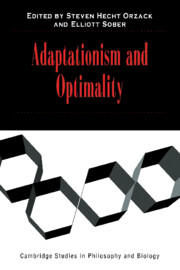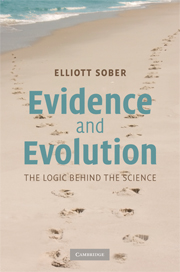Ockham's Razors
A User's Manual
- Author: Elliott Sober, University of Wisconsin, Madison
- Date Published: July 2015
- availability: Available
- format: Paperback
- isbn: 9781107692534
Paperback
Other available formats:
Hardback, eBook
Looking for an inspection copy?
Please email [email protected] to enquire about an inspection copy of this book
-
Ockham's razor, the principle of parsimony, states that simpler theories are better than theories that are more complex. It has a history dating back to Aristotle and it plays an important role in current physics, biology, and psychology. The razor also gets used outside of science - in everyday life and in philosophy. This book evaluates the principle and discusses its many applications. Fascinating examples from different domains provide a rich basis for contemplating the principle's promises and perils. It is obvious that simpler theories are beautiful and easy to understand; the hard problem is to figure out why the simplicity of a theory should be relevant to saying what the world is like. In this book, the ABCs of probability theory are succinctly developed and put to work to describe two 'parsimony paradigms' within which this problem can be solved.
Read more- Defends two justifications for using Ockham's razor in science and examines whether Ockham's razor can be used to solve philosophical problems
- Provides non-expert readers with a brief tutorial in probability theory
- Includes several detailed case studies of the uses and misuses of Ockham's razor
Awards
- Honourable Mention, 2016 PROSE Award for Philosophy
Reviews & endorsements
'Sober's treatment of the role of Ockham's razor in scientific methodology is, quite simply, the best that one can find in the philosophical literature today. With excursions into such diverse topics as model construction, Bayesian statistics, phylogenetic inference, philosophy of mind, and general philosophical methodology, readers of all stripes will find this book rewarding.' James M. Joyce, Cooper Harold Langford Collegiate Professor of Philosophy, University of Michigan, Ann Arbor
See more reviews'Ockham's Razors is a great book that philosophers, scientists, and anyone else interested in reasoning about the empirical world would do well to read carefully.' Daniel Steel, Notre Dame Philosophical Reviews
'A flawless crash course in probability theory is expertly delivered at the outset, providing the casual reader with everything needed to grapple with the fairly technical discussions that follow.' Tom Graham, The Times Literary Supplement
'I view this monograph as an ideal introduction to Sober's philosophy. This is helped by [his] clear and entertaining style of writing: Ockham's Razors is a pleasure to read. As such, I recommend the book to any graduate student with interests in the philosophy of science, the philosophy of probability or the philosophy of biology. Furthermore, the book is suitable for a graduate seminar on Ockham's razor and individual chapters can be used for specialist graduate courses in the philosophy of probability, the philosophy of biology and the philosophy of mind.' Bengt Autzen, Philosophy of Science
'It is an impressive work - well worth reading for philosophers and scientists from a number of different fields and essential reading for philosophers of science interested in scientific epistemology.' Joel Velasco, Mind
Customer reviews
Not yet reviewed
Be the first to review
Review was not posted due to profanity
×Product details
- Date Published: July 2015
- format: Paperback
- isbn: 9781107692534
- length: 322 pages
- dimensions: 247 x 175 x 15 mm
- weight: 0.66kg
- contains: 42 b/w illus.
- availability: Available
Table of Contents
Introduction
1. A history of parsimony in thin slices (from Aristotle to Morgan)
2. The probabilistic turn
3. Parsimony in evolutionary biology - phylogenetic inference
4. Parsimony in psychology - chimpanzee mind-reading
5. Parsimony in philosophy
References.
Sorry, this resource is locked
Please register or sign in to request access. If you are having problems accessing these resources please email [email protected]
Register Sign in» Proceed
You are now leaving the Cambridge University Press website. Your eBook purchase and download will be completed by our partner www.ebooks.com. Please see the permission section of the www.ebooks.com catalogue page for details of the print & copy limits on our eBooks.
Continue ×Are you sure you want to delete your account?
This cannot be undone.
Thank you for your feedback which will help us improve our service.
If you requested a response, we will make sure to get back to you shortly.
×



